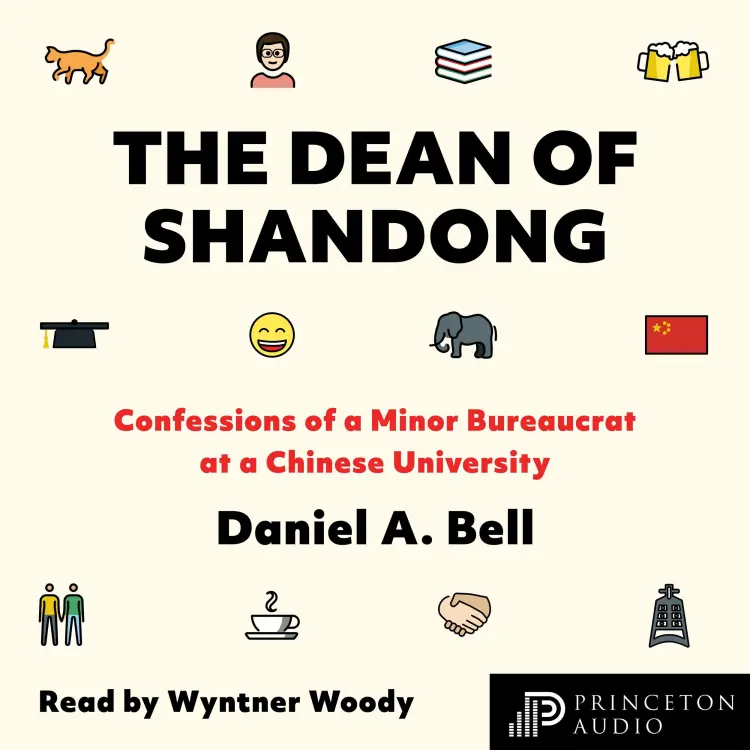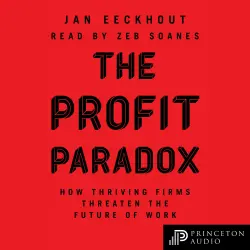
The Dean of Shandong - Confessions of a Minor Bureaucrat at a Chinese University
Daniel A. Bell
Explore the inner workings of Chinese academia and politics through the eyes of a foreign dean at Shandong University.
Unabridged
5 horas 42 minutos
Nota: La reproducción de los audiolibros o de las obras de audio en las respectivas plataformas, por ejemplo Spotify, puede generar gastos. Lismio no tiene ninguna influencia sobre qué audiolibros y obras de audio están disponibles en el servicio.
Algunos artículos contienen enlaces de afiliados (marcados con un asterisco *). Si hace clic en estos enlaces y compra productos, recibiremos una pequeña comisión sin coste adicional para usted. Su apoyo ayuda a mantener este sitio en funcionamiento y a seguir creando contenidos útiles. Gracias por su apoyo.
De la editorial
This audiobook narrated by Wyntner Woody provides an inside view of Chinese academia and what it reveals about China's political system
On January 1, 2017, Daniel Bell was appointed dean of the School of Political Science and Public Administration at Shandong University-the first foreign dean of a political science faculty in mainland China's history. In The Dean of Shandong, Bell chronicles his experiences as what he calls "a minor bureaucrat," offering an inside account of the workings of Chinese academia and what they reveal about China's political system. It wasn't all smooth sailing-Bell wryly recounts sporadic bungles and misunderstandings-but Bell's post as dean provides a unique vantage point on China today.
Bell, neither a Chinese citizen nor a member of the Chinese Communist Party, was appointed as dean because of his scholarly work on Confucianism-but soon found himself coping with a variety of issues having little to do with scholarship or Confucius. These include the importance of hair color and the prevalence of hair-dyeing among university administrators, both male and female; Shandong's drinking culture, with endless toasts at every shared meal; and some unintended consequences of an intensely competitive academic meritocracy. As dean, he also confronts weightier matters: the role at the university of the Party secretary, the national anticorruption campaign and its effect on academia (Bell asks provocatively, "What's wrong with corruption?"), and formal and informal modes of censorship. Considering both the revival of Confucianism in China over the last three decades and what he calls "the Communist comeback" since 2008, Bell predicts that China's political future is likely to be determined by both Confucianism and Communism.
On January 1, 2017, Daniel Bell was appointed dean of the School of Political Science and Public Administration at Shandong University-the first foreign dean of a political science faculty in mainland China's history. In The Dean of Shandong, Bell chronicles his experiences as what he calls "a minor bureaucrat," offering an inside account of the workings of Chinese academia and what they reveal about China's political system. It wasn't all smooth sailing-Bell wryly recounts sporadic bungles and misunderstandings-but Bell's post as dean provides a unique vantage point on China today.
Bell, neither a Chinese citizen nor a member of the Chinese Communist Party, was appointed as dean because of his scholarly work on Confucianism-but soon found himself coping with a variety of issues having little to do with scholarship or Confucius. These include the importance of hair color and the prevalence of hair-dyeing among university administrators, both male and female; Shandong's drinking culture, with endless toasts at every shared meal; and some unintended consequences of an intensely competitive academic meritocracy. As dean, he also confronts weightier matters: the role at the university of the Party secretary, the national anticorruption campaign and its effect on academia (Bell asks provocatively, "What's wrong with corruption?"), and formal and informal modes of censorship. Considering both the revival of Confucianism in China over the last three decades and what he calls "the Communist comeback" since 2008, Bell predicts that China's political future is likely to be determined by both Confucianism and Communism.













